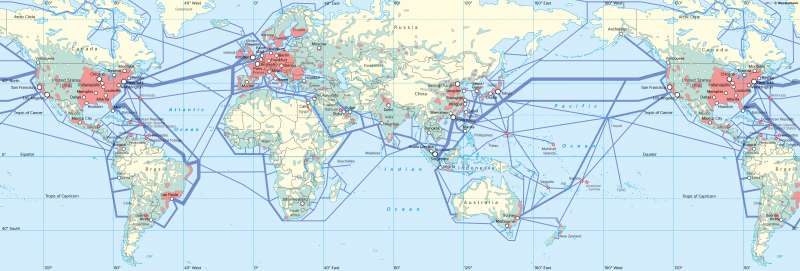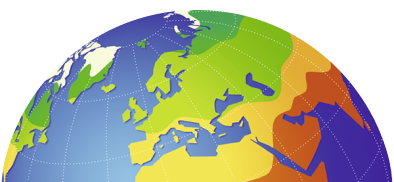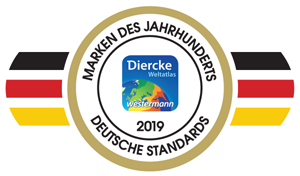The World - Economic centres and global communication
Global communication
978-3-14-100890-6 | Page 44 | Ill. 1

Overview
The atlas map shows the importance and international interconnections of some globally significant economic centres by the extent of their communicative networking. Today, global cities are the most important drivers of economic activity worldwide.
Global cities and tax havens
Typical characteristics of a global city are: - the strong concentration of headquarters of multi- and transnational companies, - a significant function as an international financial centre - the concentration of knowledge-intensive business services, and - their capacity as headquarters of international political institutions, such as the United Nations, and important non-governmental organisations (NGOs). In addition, global cities usually serve as transport hubs for international air traffic and goods handling and as preferred centres for international congresses or trade fairs.
A hierarchy of importance can be discerned between global cities. Global centres such as London, New York and Tokyo undoubtedly possess all the characteristic features. Paris, the Chinese capital Beijing, the Pearl River Delta megacity (Hong Kong-Guangzhou-Shenzhen) or Singapore could also be mentioned. In addition, there are centres with a more continental significance, such as Frankfurt and Berlin, Brussels, Milan, or Madrid in Europe.
So-called tax havens are countries in which no or only very low taxes have to be paid on assets, income, profits and financial transfers. They are mostly micro and small states that profit from tax tourism. Their importance is evident in the data flows between the USA and the Caribbean. In most cases, the countries do not belong to any economic or international alliance for legal reasons.
A special form of tax havens are countries such as Panama, Liberia, Malta, Cyprus, or the Bahamas, all of which maintain larger trading fleets than Germany, for example, by issuing flags of convenience. Besides tax advantages, low social standards and wages are also a motive for reporting ships under a flag of convenience.
Global communication and networking
Global data flows are heavily skewed towards the countries of the Triad - North America, the European Union, East and Southeast Asia. The US, the EU, Japan, Korea, and Taiwan also have very high internet density over large areas, with the exception of a few peripheral or sparsely populated regions. In the other countries of East and Southeast Asia, however, the contrast is greater. There, it is only the globally important economic centres or metropolitan regions that achieve a high internet density.
Within the triad, the mother country of the internet, the USA, once again occupies a special position. This is where most "internet exchange points" are located, i.e. exchange points for data traffic that are connected by high-speed links. The USA is also home to many market-dominating internet companies such as Google and Facebook.
In China, internet use is still strongly determined by politically motivated partial foreclosure and censorship. This manifests itself in comparatively low data flows, which is in sharp contrast to China's economic position. The Hong Kong Special Administrative Region has a special position within China due to its history.
A "digital divide" is evident in Africa and large parts of Asia: with few exceptions, there are extensive areas here whose population is excluded from using the internet. Since access to information is considered a central key to technological, economic, and social progress, this widens the development gap with rich countries. An improvement in the situation can possibly be achieved through mobile internet, which is becoming increasingly widespread because the infrastructural prerequisites are much lower.




